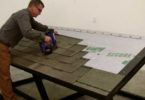If your goal is to simply cover up spots or stains on your garage floor, consider staining over them. Concrete stains will cost about $100 – $250 to cover an average sized garage. Concrete paint covered with polyurethane is another low cost option.
Paints specifically for garage flooring contain epoxy, which is a resin that helps protect the floor. One part systems containing paint and epoxy premixed, may be less durable than two part systems which include a base coat, epoxy pigment chips to broadcast over the base, and a durable high gloss top coat. For about $150 to $400 to cover roughly 450 square feet, you can purchase a kit that contains everything needed to prep, base coat, and top coat your floor. Options include a wide array of pigments including metallic, and anti skid agents for traction. Base coats can be pure solids, contain solvent, or be water based. Some experts suggest that pure solids base coats are difficult to apply, and should be done by professionals rather than as a DIY project. Non toxic formulas are also available for a slightly higher cost.
Most of the work of applying epoxy products is in proper preparation. The concrete must be meticulously cleaned in order for these products to properly adhere and resist peeling. Cleaning includes thorough sweeping, removing oil or grease stains, and washing the floor. Some experts recommend using a power hose; others recommend scrubbing with a stiff brush, using an all purpose cleaner or liquid detergent, and rinsing. Old sealant may have to be removed using chemical treatments. For optimum adherence, your concrete floor may need to be etched. Experts recommend sprinkling water onto the floor. If beads form, then purchase etching acid and follow the manufacturer’s instructions. When done, the concrete surface should have the consistency of medium grit sandpaper. A concrete bonding agent may also help.
Application requires lint free rollers, and nylon brushes to cut in the edges. Be sure to maintain adequate ventilation, and you might need a respirator to avoid breathing toxic fumes. If you are using a kit, know ahead of time if you will need to purchase additional materials. Depending on what products you use, it can take one to several days to apply and dry, and generally 3 days to a week before you can drive your car onto your new floor.
Another way to cover a garage floor is to use tiles. These can be glued to the floor with adhesive, be self stick, or be a “floating” floor, in which tiles are interlocked together by tabs that run along the edges. Tiles usually range from 12 x 12 inch to 19 x19 inch squares, and interlocking tiles are less labor intensive, requiring only a rubber mallet to connect the tabs and a utility knife or saw to cut tiles to size. Multiple patterns and a variety of colors are available, which makes checkerboard or other designs fairly easy.
Both polyvinyl chloride (PVC) and polypropylene tiles retail for about $6 – $7 per square foot, are durable, easy to clean, and can handle the weight of your vehicle. While the floor doesn’t have to be in mint condition, it should still be level with major defects repaired. PVC and polypropylene tiles also come in open weave that allows water or oil to drain onto the floor, away from your feet and your car. These type tiles can be easily moved, and easily cleaned with a shop vac.
It’s recommended that PVC and polypropylene tiles be allowed to adapt to room temperature before laying. Measure to calculate how many tiles you will need, and make sure lines are straight. Experts recommend starting in the center, tiling around very heavy objects and leaving a quarter of an inch at the edges for expansion. These materials also come in large mats that can be rolled out onto the garage floor, at roughly half the cost of tile. Polypropylene may be slightly more prone to oxidation and the effects of UV light, but appears to be more environmentally friendly than PVC.
Commercial grade carpet tiles are an option for cheap garage flooring at roughly similar cost to PVC. These are usually self stick, made of synthetic fibers, power washable and can stand up to a car being parked on them. Aluminum tiles are also durable and easy to place, but are more expensive at about $10 per sq. ft. Interlocking tiles and mats made of recycled rubber and foam are a good choice if the garage is used for exercising, or as a workshop, and cost about $3 – $8 per sq. ft. Although these are also fairly durable, they will not withstand the weight of your car, and should not be used in the parking area of your garage.



